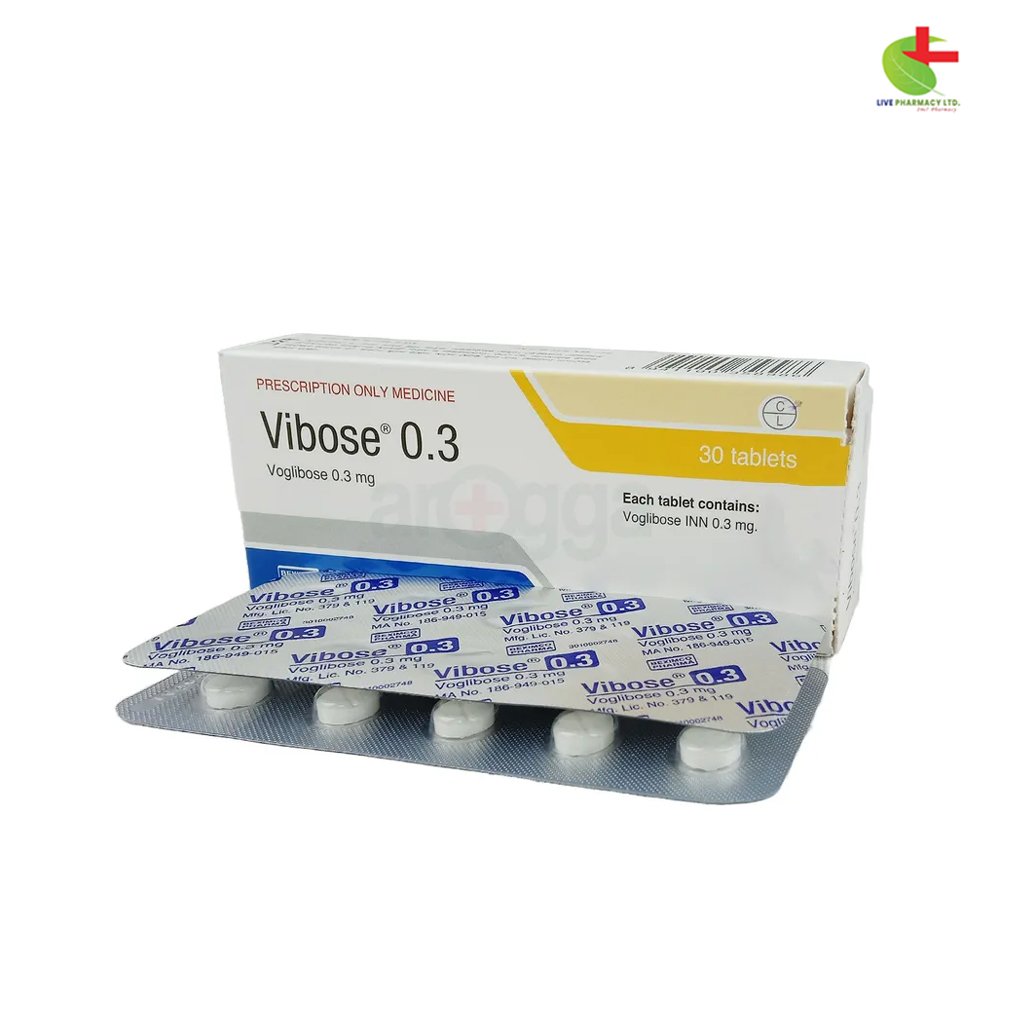Vibose 0.3
80.00৳ Strip
- Vibose helps manage post-prandial hyperglycemia in diabetes mellitus when diet and other treatments are insufficient.
- Delays carbohydrate digestion and absorption, aiding in blood glucose control.
- Indicated for type 2 diabetes, glycemic control during insulin therapy, and diabetes prevention in those with impaired glucose tolerance.
- Beneficial for special populations, including the elderly and those with hepatic or renal impairment.
 Brand
Brand
|
Beximco Pharmaceuticals Ltd |
|---|---|
 Generics
Generics
|
Voglibose |
 Type
Type
|
Tablet |
Indications
Vibose is prescribed for managing diabetes mellitus (DM) to reduce post-prandial hyperglycemia (PPHG) when diet, exercise, and other therapies such as oral hypoglycemic agents (OHAs) or insulin fail to provide adequate glycemic control.
Vibose is recommended for:
- Type 2 Diabetes Mellitus (Non-Insulin-Dependent Diabetes Mellitus – NIDDM): As an adjunct to other OHAs.
- Combination Therapy: Used alongside insulin for diabetes management.
- Prevention: Reducing the risk of type 2 diabetes in individuals with impaired glucose tolerance (only for Vibose 0.2 mg Tablets). This use is appropriate only when dietary and exercise measures have not improved glucose tolerance.
- Special Populations: Beneficial for elderly patients, those with liver dysfunction, or mild to moderate renal impairment where other OHAs may be contraindicated or require caution.
- Glycogen Storage Disease: Prevents hypoglycemia in type I glycogen storage disease due to its amylase (glucosidase) inhibition.
- Non-Diabetic Hyperinsulinemia: Helps prevent hypoglycemic episodes.
- Steroid-Induced Diabetes Mellitus: Useful, though clinical data is limited in this context.
Description
Vibose shares similar properties with acarbose and works by selectively inhibiting α-glucosidase in the gastrointestinal tract. This inhibition delays carbohydrate digestion and absorption, mitigating sharp increases in post-prandial blood glucose levels.
Pharmacology
Alpha-glucosidase inhibitors, including Vibose, function as competitive blockers of digestive enzymes essential for carbohydrate breakdown. These enzymes include alpha-glucosidase in the small intestine’s brush border and pancreatic alpha-amylase. By inhibiting these enzymes, Vibose slows the digestion of complex carbohydrates, reducing glucose absorption and resulting in lower post-meal blood glucose levels. Long-term use helps in marginally lowering hemoglobin A1c levels.
Dosage & Administration
- Adults: Typically, Vibose is taken at 0.2 mg, three times daily before meals. If needed, the dose can be increased to 0.3 mg per dose.
- Pediatrics: Safety and effectiveness in children have not been established.
- Geriatrics: For elderly patients, starting at a lower dose of 0.1 mg is advised due to decreased physiological function. Monitor blood sugar levels and gastrointestinal symptoms closely.
Consult a healthcare provider for personalized dosing and administration.
Interaction
Vibose should be used cautiously with the following:
- Enhancing Hypoglycemic Effects: β-blockers, salicylic acid, MAO inhibitors, fibrates, warfarin.
- Diminishing Hypoglycemic Effects: Adrenaline, corticosteroids, thyroid hormones.
Contraindications
Do not use Vibose if you have:
- Allergies to Voglibose or its ingredients.
- Diabetic ketoacidosis or pre-coma.
- Severe infections, major surgery, or serious trauma.
- Gastrointestinal obstruction or predisposition to it.
Side Effects
Common side effects include:
- Diarrhea, loose stools, abdominal discomfort, constipation.
- Nausea, vomiting, heartburn, increased gas.
- Rare: Hepatic issues, anemia, blurred vision, and elevated pancreatic enzymes.
Vibose may also cause hypoglycemia when combined with OHAs.
Pregnancy & Lactation
- Pregnancy: The safety of Vibose during pregnancy is not well established. Limited studies are available.
- Lactation: Due to minimal levels in breast milk, it is recommended to avoid Vibose during breastfeeding.
Precautions & Warnings
Use Vibose with caution in:
- Patients on other antidiabetic medications due to hypoglycemia risk.
- Individuals with a history of gastrointestinal conditions or chronic intestinal diseases.
- Those with severe liver or renal dysfunction.
- Elderly patients due to potential adverse effects on blood glucose control and increased risk of gastrointestinal symptoms.
Use in Special Populations
Vibose is minimally absorbed and has negligible renal excretion, so dose adjustments are typically unnecessary in renal failure. However, there is no pharmacokinetic data for patients with renal insufficiency.
Overdose Effects
Vibose overdose generally does not cause hypoglycemia but may lead to transient gastrointestinal issues like flatulence, diarrhea, and abdominal discomfort. Serious systemic reactions are unlikely.
Therapeutic Class
Alpha-Glucosidase Inhibitor
Storage Conditions
Store Vibose in a cool, dry place, away from children, and protect from light.













Reviews
There are no reviews yet.